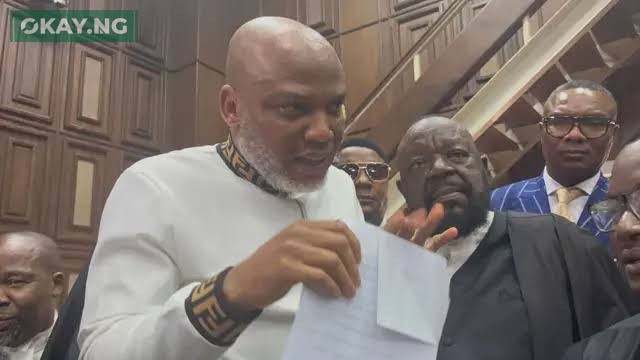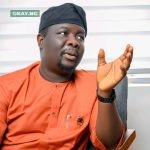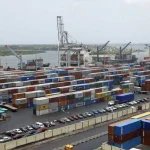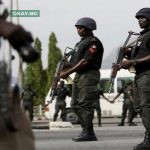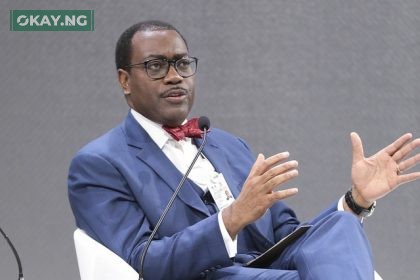Mazi Nnamdi Kanu, leader of the Indigenous People of Biafra (IPOB), has accused the Nigerian federal government of using deceptive strategies to keep him in prolonged detention.
Kanu pointed to a significant ruling on March 1, 2017, when the Federal High Court in Abuja determined that IPOB was not an unlawful organization. The verdict resulted from a criminal trial that required proof beyond a reasonable doubt, with both the federal government and Kanu presenting their arguments.
Rather than challenging the ruling through an appeal, Kanu alleged that the then Attorney-General, Abubakar Malami, secretly worked with the late Abba Kyari to classify IPOB as a terrorist organization through ex parte proceedings, which were carried out without notifying him or IPOB.
‘’Alas! Instead of the federal government going on appeal as the law mandated (if they are dissatisfied with the judgment), the former Attorney-General (Abubakar Malami) went behind closed doors with a letter signed by late Abba Kyari and got IPOB proscribed/tagged a terrorist group in an ex parte proceedings that conducted without notice to me or to the IPOB.”
Kanu describes this incident as an early indication of a collusion between the government and judiciary to deny his rights and jeopardize the lives of millions identifying with IPOB.
‘’This abominable incident was the earliest sign yet that the government and its judiciary have struck an unholy and fraudulent alliance to deny me my rights and thereby imperil the life and liberty of millions who identify with IPOB.”
Additionally, on October 26, 2022, the Federal High Court ruled that Kanu’s extraordinary rendition and continued detention were unconstitutional.
The court directed the federal government to offer an apology and provide compensation to Kanu. He argues that in a well-governed society, such a judgment should have resulted in his immediate release and encouraged the government to engage meaningfully in discussions on the self-determination issues at the core of the case.
‘’The court further ordered the federal government to apologize to me and pay me compensation. In a responsible society and well-ordered, run by a responsible government, this judgment is sufficient to have ended my lengthy detention and encourage the federal government to constructively engage me on the issue of the self-determination agitation that triggered this whole saga.”
‘’Pedal back to October 13, 2022, when the Court of Appeal held that: ‘The courts must never shy away from calling the executive to order when they resort to acts of ‘executive lawlessness.’”
The court stressed the importance of maintaining a balance between law and order while safeguarding individuals from oppressive executive actions.
It further ruled that Kanu’s forcible abduction and extraordinary rendition from Kenya to Nigeria on June 27, 2021, contravened both international and domestic laws, thereby stripping any Nigerian court of the authority to prosecute him.
Despite the clarity of this ruling, Kanu alleges that the federal government refused to release him. Instead, he claims that officials secretly collaborated with three other justices of the Court of Appeal to overturn the judgment by securing a ‘stay of execution.’
Kanu questions the legitimacy of granting a stay on a judgment that the government had already ignored, citing the Supreme Court’s established position that entities in violation of court orders cannot seek judicial relief until those orders are obeyed. He argues that this principle is being selectively disregarded in his case.
On December 15, 2023, the Supreme Court referred Kanu’s case back to the Federal High Court for trial. The apex court also ruled that the revocation of his bail was unjustified, citing clear and unacceptable bias on the part of the judge responsible for the decision.
“’This is a sound reasoning that applies to everybody but is fraudulently overlooked when it comes to my case. Fast forward to 15th December 2023 when the Supreme Court sent back my case to the Federal High Court for trial.”
‘’For avoidance of doubt, that was not the only decision the Supreme Court made. It also decided that my bail should not have been revoked and it went on to state clearly that the judge exhibited significant and unacceptable bias by revoking my bail.”
‘’Despite the clarity of this judgment and its comportment with reason, the federal government refused to release me from detention while it went behind closed doors and connived with three other justices of the court of appeal who fraudulently and swiftly sat on appeal over the judgment and practically destroyed it by issuing what they termed ‘a stay of execution’”.
‘’But instead of the Chief judge of the Federal High Court doing the lawful thing by assigning my case to another judge, he connived with the federal government to eat crow and send my case to a judge that stands rescued by a valid order.”
In his open letter, Kanu clarified that his remarks should not be misunderstood as implying that no judges in Nigeria were capable of delivering fair and impartial justice in his case. He stressed that this was not the issue in question.
Instead, he asserted that his case was intentionally being withheld from judges and justices known for their dedication to justice, even when their rulings might not favor the federal government.
Kanu further stated that if securing a trial before a legitimate and impartial court required him to remain in detention for the rest of his life, he was willing to endure that consequence.
However, he firmly declared that he would never submit to any trial overseen by a judge or court whose jurisdiction, in his view, failed to meet constitutional requirements—neither now nor in the future.


